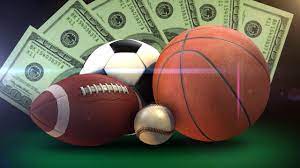- Horse Racing: Placing a bet on a specific horse to win a race, finish in a certain position (such as to come in the top three), or predicting the exact order of finish for multiple horses (known as an exacta, trifecta, or superfecta bet).
- Casino Gambling: Betting on games such as blackjack, roulette, or slot machines. For instance, placing a wager on a specific number or color in roulette or betting on the player’s or banker’s hand in baccarat.
- Sports Betting: Betting on various sports events, including individual matches, tournaments, or overall season outcomes. For example, placing a bet on the point spread or the total score in a basketball game, or predicting the winner of a tennis tournament.
- Poker: Betting in poker involves wagering chips or money on the strength of your hand relative to other players. This includes actions like calling, raising, or folding based on your assessment of the probability of winning the hand.
- Political Betting: Betting on political events, such as elections or referendums. This can involve predicting the winning candidate or party, voter turnout, or specific policy outcomes.
These examples illustrate the diverse range of betting activities across different domains. Whether it’s in traditional gambling settings, sports, or casual social bets, betting involves predicting outcomes and risking something of value, whether it be money, chips, or other items, on the accuracy of those predictions. Remember to always bet responsibly and within your means.
Horse Racing
- Win Bet: This is a straightforward bet where you wager on a specific horse to win the race. If your chosen horse finishes first, your bet is successful, and you receive a payout based on the odds set by the bookmaker.
- Place Bet: With a place bet, you are betting on a horse to finish in one of the top positions, usually first, second, or sometimes third. If your chosen horse finishes within the specified positions, your bet is successful, and you receive a payout, although the payout is generally lower than that of a win bet.
- Each-Way Bet: An each-way bet combines a win bet and a place bet into a single wager. You are essentially placing two bets—one for the horse to win and another for the horse to place. If the horse wins, both the win and place portions of your bet are successful, resulting in two separate payouts. If the horse only places, you still receive a payout for the place portion of your bet.
- Exacta Bet: In an exacta bet, you are predicting the first two horses to finish the race in the exact order. This can be challenging but offers higher potential payouts. If your chosen horses finish first and second in the correct order, your bet is successful.
- Trifecta Bet: A trifecta bet involves predicting the first three horses to finish the race in the exact order. It is a more challenging bet but offers even higher potential payouts. If your chosen horses finish first, second, and third in the correct order, your bet is successful.
These are just a few examples of the types of bets you can place in horse racing. Each bet has its own set of odds and potential payouts, which can vary depending on the specific race and the participating horses. It’s important to familiarize yourself with the rules and betting options before placing your bets.
Casino Gambling
- Roulette: In roulette, you can place different types of bets, including:
- Straight Bet: Betting on a specific number. If the ball lands on that number, you win.
- Split Bet: Betting on two adjacent numbers by placing your chip on the line between them. If either of the numbers comes up, you win.
- Red/Black Bet: Betting on whether the ball will land on a red or black number. If your chosen color appears, you win.
- Odd/Even Bet: Betting on whether the ball will land on an odd or even number. If your chosen category comes up, you win.
- Blackjack: In blackjack, you place bets on your hand and compete against the dealer. Some common bets include:
- Bet to Win: Placing a bet that your hand will beat the dealer’s hand without going over 21.
- Insurance Bet: Betting that the dealer’s face-down card is a 10-value card (forming a blackjack). It’s an optional side bet to protect your initial bet if the dealer has a blackjack.
- Double Down: Doubling your initial bet and receiving one additional card. This bet is typically placed when you believe you have a strong hand.
- Slot Machines: In slot machines, you typically choose the amount you want to bet per spin. The potential payout depends on the specific combination of symbols that appear on the reels.
- Single Line Bet: Betting on a single line or payline in a slot machine.
- Multi-Line Bet: Betting on multiple lines or paylines simultaneously, increasing your chances of winning.
- Baccarat: In baccarat, you can place bets on either the player’s hand, the banker’s hand, or a tie. The goal is to bet on the hand that will have a point value closest to 9.
- Player Bet: Betting on the player’s hand to have a higher point value than the banker’s hand.
- Banker Bet: Betting on the banker’s hand to have a higher point value than the player’s hand.
- Tie Bet: Betting that both the player’s and banker’s hands will have the same point value.
These are just a few examples of the types of bets or rates you can place in casino gambling. Each game has its own unique betting options, rules, and potential payouts. It’s important to understand the specific game rules and betting options before placing your bets in a casino.

Sports Betting
- Moneyline Bet: This is a straightforward bet where you wager on the outcome of a match or game. You simply choose the team or player you http://phforums.co.za believe will win. The odds associated with each team/player indicate the potential payout. If your chosen team/player wins, your bet is successful, and you receive a payout based on the odds.
- Point Spread Bet: In a point spread bet, the sportsbook assigns a point spread to a match to create a more balanced betting scenario. You can choose to bet on either the favorite or the underdog. If you bet on the favorite, they must win by a margin greater than the point spread for your bet to be successful. If you bet on the underdog, they must either win the match or lose by a margin less than the point spread.
- Over/Under Bet: In an over/under bet, you wager on the total combined score of both teams or participants in a match. The sportsbook sets a predicted total, and you can bet on whether the actual total will be over or under that number. If the actual total matches your prediction, your bet is successful.
- Prop Bets: Prop bets, short for proposition bets, are wagers on specific events or occurrences within a game or match that may not directly impact the final outcome. Examples include betting on the first team to score, the number of goals scored by a specific player, or the number of strikeouts by a pitcher.
- Futures Bets: Futures bets involve betting on the outcome of a future event, typically before the season or tournament begins. For example, you can bet on the winner of a league, championship, or tournament well in advance. The odds for futures bets can be quite attractive but may change over time as the event approaches.
Poker
- Ante: An ante is a small forced bet that all players must contribute before the hand is dealt. It ensures there is money in the pot for each hand.
- Blind Bets: In games like Texas Hold’em, there are two types of blind bets: the small blind and the big blind. The blinds are forced bets that players on the left of the dealer button must place before the hand begins. The small blind is usually half the size of the big blind.
- Bet/Raise: After the initial cards are dealt, players have the option to bet or raise. A bet is when a player puts forward an initial amount of chips into the pot. If a player wants to increase the bet, they can choose to raise by putting in more chips than the previous bet.
- Call: When a player wants to match the current bet, they make a call by putting in the same amount of chips as the previous bet.
- Check: If no one has made a bet before a player’s turn, they have the option to check, which means they don’t place any additional chips into the pot and pass the action to the next player.
Political Betting
Political betting involves placing bets on various political events, such as elections, referendums, or political outcomes. Here’s an example of how rates or odds might be presented in political betting:
- Betting on Election Winners: In the context of an election, you can place bets on the candidate or party you believe will win. The odds associated with each candidate or party represent the likelihood of them winning the election. For example:
- Candidate A: 2/1 odds (If you bet $1 and Candidate A wins, you receive $2 in profit plus your initial stake back)
- Candidate B: 5/1 odds (If you bet $1 and Candidate B wins, you receive $5 in profit plus your initial stake back)
- Candidate C: 10/1 odds (If you bet $1 and Candidate C wins, you receive $10 in profit plus your initial stake back)
- Referendum Outcomes: In the case of a referendum, you can place bets on the outcome, such as whether the referendum will pass or fail. The odds associated with each outcome reflect the perceived likelihood of that outcome occurring.
